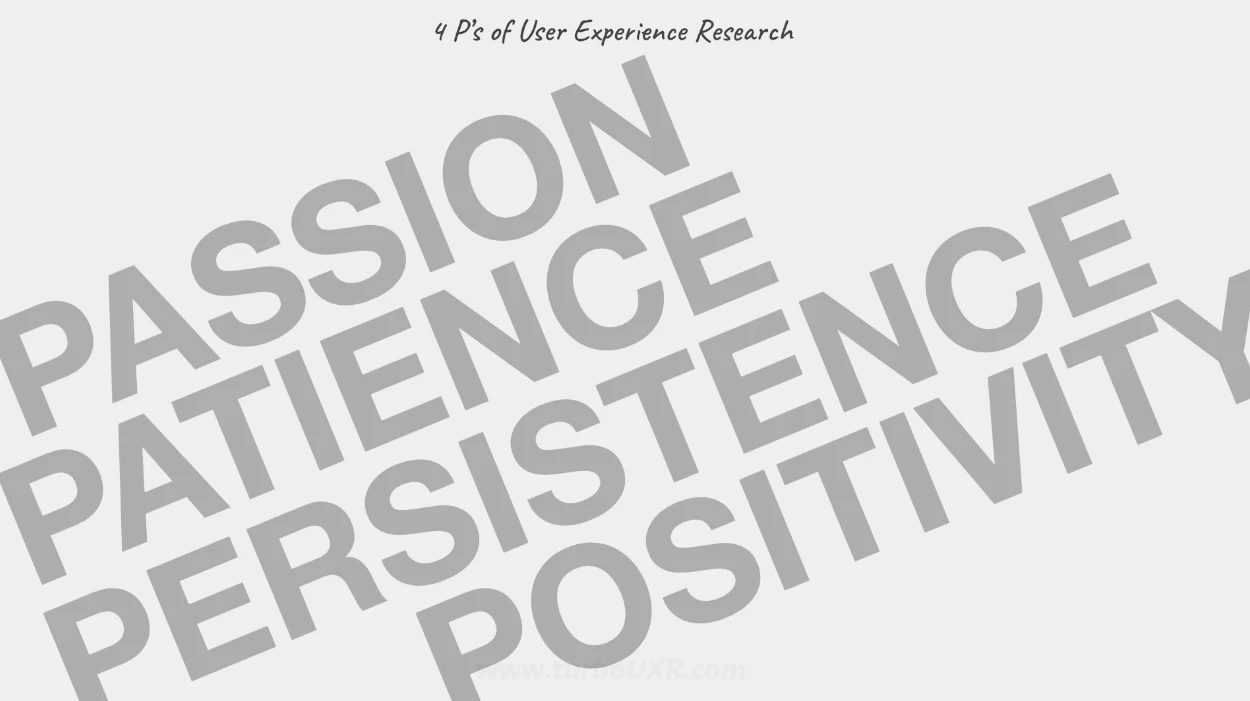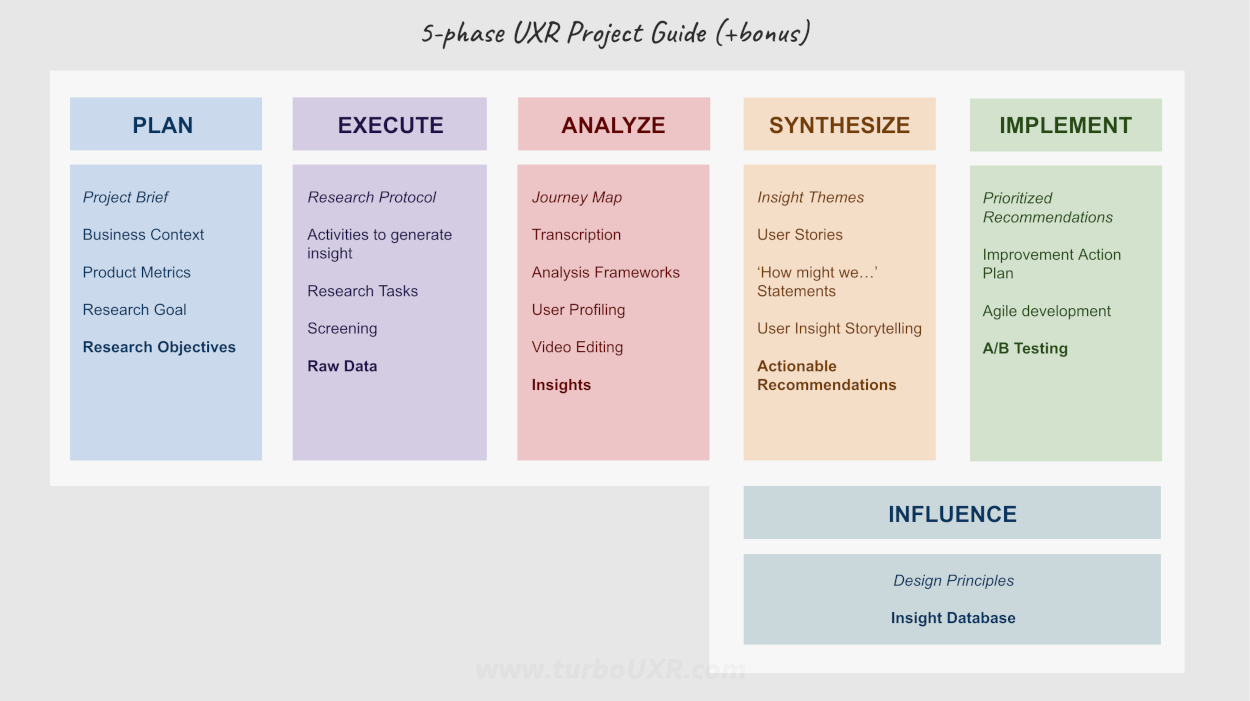Need user insights? Get the Playbook 📕
Practice makes perfect. And to practice in UX research, you've got to stand the test of time. See new challenges. Experience different stakeholders. Explore new methods. Deliver valuable user insights... time and time again. All of this will provide ample confidence and courage to perform at your best for years to come.
Work smarter, not harder.
The Turbo UXR Playbook is your tactical reference 👇 guide — free to download!
Get the Playbook
Learn More
To obtain this experience, and maintain the long-view in the grind of everyday UXR work, we've developed a mantra... The 4 P's of user experience research: Passion, Patience, Positivity, and Persistence. In addition to learning how to standardize UX research with templates, understanding how to identify typical UXR inflection points, and consistently adhering to a phased approach to user research projects, the 4P's mindset is a sure way to effectively scale your efforts.
🅿️ Passion, Patience, Positivity, and Persistence.
In this article, we'll describe what makes a successful user researcher, why it's important to stay resilient on the long-haul, and detail each of the 4P's along with how you can rely on them. No lie, the 4P's is the most important tool on our UX research career belt.
Time to unpack the P's!
user advocacy human-centered design user-centered customer-centered emotional intelligence E-IQ psychological strength change management product design ux mindset
UX Researchers are staunch advocates for the user. They analyze the existing (and future-state) user experience for pains, gains, and opportunities to improve. They ensure the users' view is included in the organization's decisions.
Curiosity. Pragmatism. Business-minded. Empathetic. Creative. Advocate. User-centered. Communicative. Detail-oriented. Actionable. These are all terms that go hand-in-hand with being a user researcher.
User experience researchers (UXRrs) are genuinely curious about how users actually interact with a product or service. UXRs will qualitatively and quantitatively analyze the existing user experience to understand what's working well, pain points, opportunities, and new ideas. Furthermore, UXRrs are advocates for the user. They communicate the reality of the user behaviors, perceptions, and needs.
Why? Because often times in organizations the user perspective is not properly included in critical decisions. The users' influence and awareness wanes over time. Tradeoffs related to internal development, finances, time, politics and more often supersede the end-user during internal meetings about strategy, planning, and action. This lack of user focus can lead to complacency, market disconnect, and lack of innovation. All of which paves the way for competition to take market share.
Therefore, the UXRrs' job is to make sure the user is heard, seen, and felt. Because ultimately the user is the one for whom we are designing and developing. It's the UXRrs' job to keep them at the organization's decision-making table.
Work smarter, not harder.
The Turbo UXR Playbook is your tactical reference 👇 guide — free to download!
Get the Playbook
Learn More
Over time, UX researchers must build an arsenal of projects to compound their understanding across the ecosystem of user experiences. Resilience is needed to consistently synthesize meaningful insights and opportunities in the face of various barriers.
UX Research is a marathon. No individual project yields all the insight. Numerous project engagements will compound your understanding of the user, product, experience, opportunities, mental models, and more. The key is to build enough experience at an organization to be able to examine the full ecosystem of product experiences. And then be able to consistently synthesize meaningful insights and opportunities for others to digest.
Building resilience is critical to attaining/spreading this knowledge. Resilience against antagonistic attitudes, users, managers, teams, competitors, internal dialogue, and more. There's good days and there's bad days at work. You must build up an arsenal of good days over time. And you must be resilient to achieve this.
User Research is a difficult job, because you are constantly uncovering opportunities to improve the UX, and sharing them with stakeholders that need to weigh many additional factors to make change happen (i.e. funding, effort, business tradeoffs, strategy, feasibility, interest, and more.). They may know already but aren't ready to change, don't want to know, don't care to know, don't have the energy/money to fix, aren't focused on that, and many other barriers. It's the nature of the job. Your job as a UXRr is to always advocate for the user. And if you're not at the table, neither will be the user. So, you gotta stay resilient.

There's a P for every situation. Write down this mantra, and use it whenever you need to identify a productive path forward. Pull a P, and lean back in to your work.
Having passion is the first and most important quality to great work. You've got to have passion for the job. The user. The insights. The process. For us, passion is occasionally acting like a mad scientist. You've got to find what drives your curiosity about a project or challenge and dive in. Especially, when no one knows which direction to take. Often this is the case in user experience research in the fuzzy front-end of initiatives. Therefore, passion is an excellent lever to pull to get things going at the beginning, and keep them rolling during lulls.
Tip: Think of your role as a UXRr akin to a mad scientist (of user experience), whose job is to make others passionately explore the realm of what's happening, and what's possible.
Return to overview ⤴UX research takes time. Not just the insight building process, but the action that is meant to take place as a result. Sometimes weeks, months, quarters or even years tick by before stakeholders are able to take action on the user insights and recommendations a project may have surfaced. We're never surprised anymore when all of a sudden something gets traction, and teams rally to take action (many months or years later). You've got to be patient in UXR. Positive change to the UX doesn't happen overnight. But when it does, you'll be proud you put in the hard work to formulate the actionable user opportunities when you did.
Tip: Trust the process. Diverging and converging can be very uneasy for others. But it's necessary to get somewhere truly novel. Help yourself and others remain patient, as real change takes time.
Return to overview ⤴Positivity matters when things get tough. Stakeholders can be grumpy, timelines can stretch, objectives can change, business dynamics shift, etc. There are usually many reasons you, or the working team, can get pulled into a negative spiral. Therefore, staying positive is a critical lever to rely on at various stages of your work. Bring the fun. Focus on appreciation. Use sandwich feedback. Ultimately, UX research requires a mindset of optimism. There's many other disciplines that need to dwell on feasibility, viability, and reliability. We're in the unique position to be scouting for new ideas, possibilities, and creative paths forward. Lean into this.
Tip: Build a reputation as the most positive person in the room/team. Start with appreciation. Celebrate the small wins. Reframe negative responses and mindsets. Always assume positive intent.
Return to overview ⤴If at first you don't succeed, try and try again. This old adage holds up well in the UX research field. You've got to tackle projects and insight communication from various angles to make it stick. For research, ask 'Why?' 5X. For analysis, answer 'So what?' 3X. For insight dissemination, say it 3 different ways, in 3 different venues. The list goes on. Repetition is crucial in the business of change. Lean on your persistence to ensure you're seeing through the challenges on the short- and long-term.
Tip: Maintain a healthy backlog of research activities to get after. Simultaneously plant many seeds with stakeholders, users, project teams, and insight channels to be able to yield valuable insights and recommendations.
Return to overview ⤴Peace is the last bonus P to be referred back to when all else fails. You've tried passion, positivity, patience, and persistence. Still not feeling quite right about the situation? You need to seek out peace. Consider your role, company, objective, and supporting life factors. These can all be important variables to getting quality work done in UX research. When in doubt, find peace. Peace with yourself. Peace with stakeholders. Peace with your mission. Peace with your life. This will help you get back on track at work.
Tip: If you've struggled for months, and consistently leveraged the 4P's to no avail, it's time to reflect on your peace. Write down major barriers, and have an honest conversation with yourself, loved ones, manager, teammates, etc.
Return to overview ⤴
The 4P's apply to all phases of the user research process. In the 'Plan' phase, you might leverage passion to get inspired about which directions to take on the research activities. In the 'Execution' phase, you need to remain patient as stakeholders and users throw different moods and attitudes at you. In the 'Analyze' phase, you'll likely lean into persistence, as you want to thoroughly document everything before making conclusions. In the 'Synthesize' phase, positivity will shine as you need to frame your insights to be well received. And the 'Implementation' phase will again require patience on the long-term as you see the organization weigh variables and take action methodologically.
Most importantly, the 'Influence' phase is cyclical an ongoing across all projects. This is where the 4P's can be continuously applied. For UXR is a marathon, and the 4Ps help you maintain your endurance, giving you the oxygen necessary to keep performing at your best.
Work smarter, not harder.
The Turbo UXR Playbook is your tactical reference 👇 guide — free to download!
Get the Playbook
Learn More